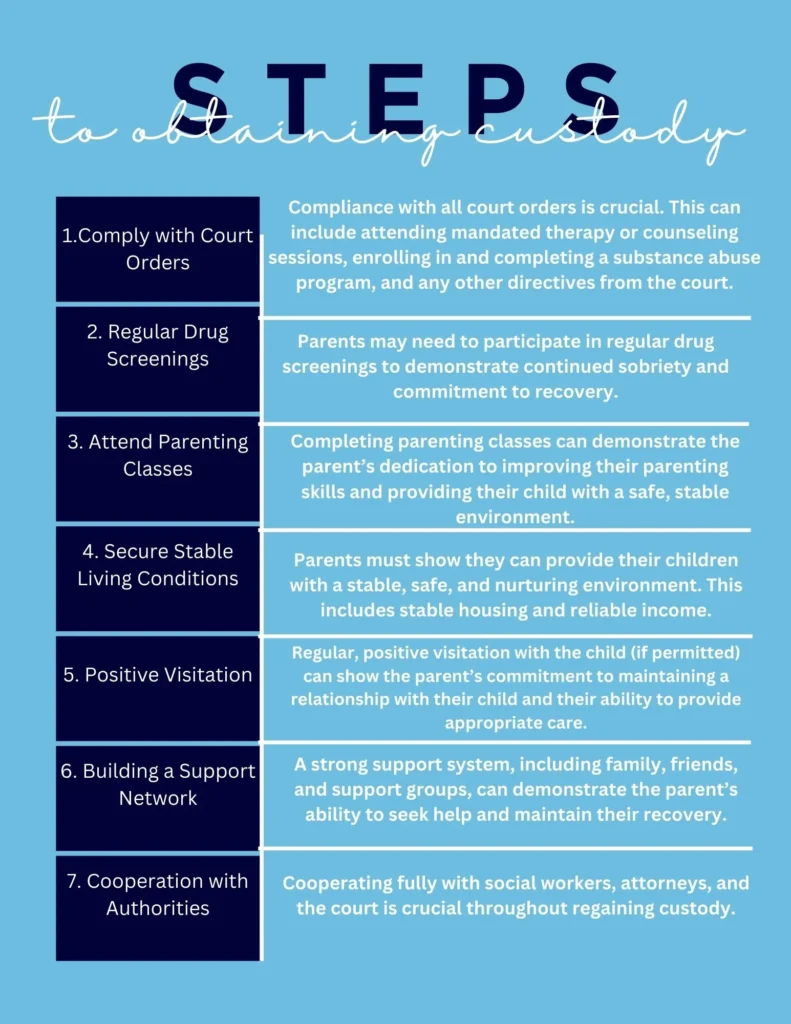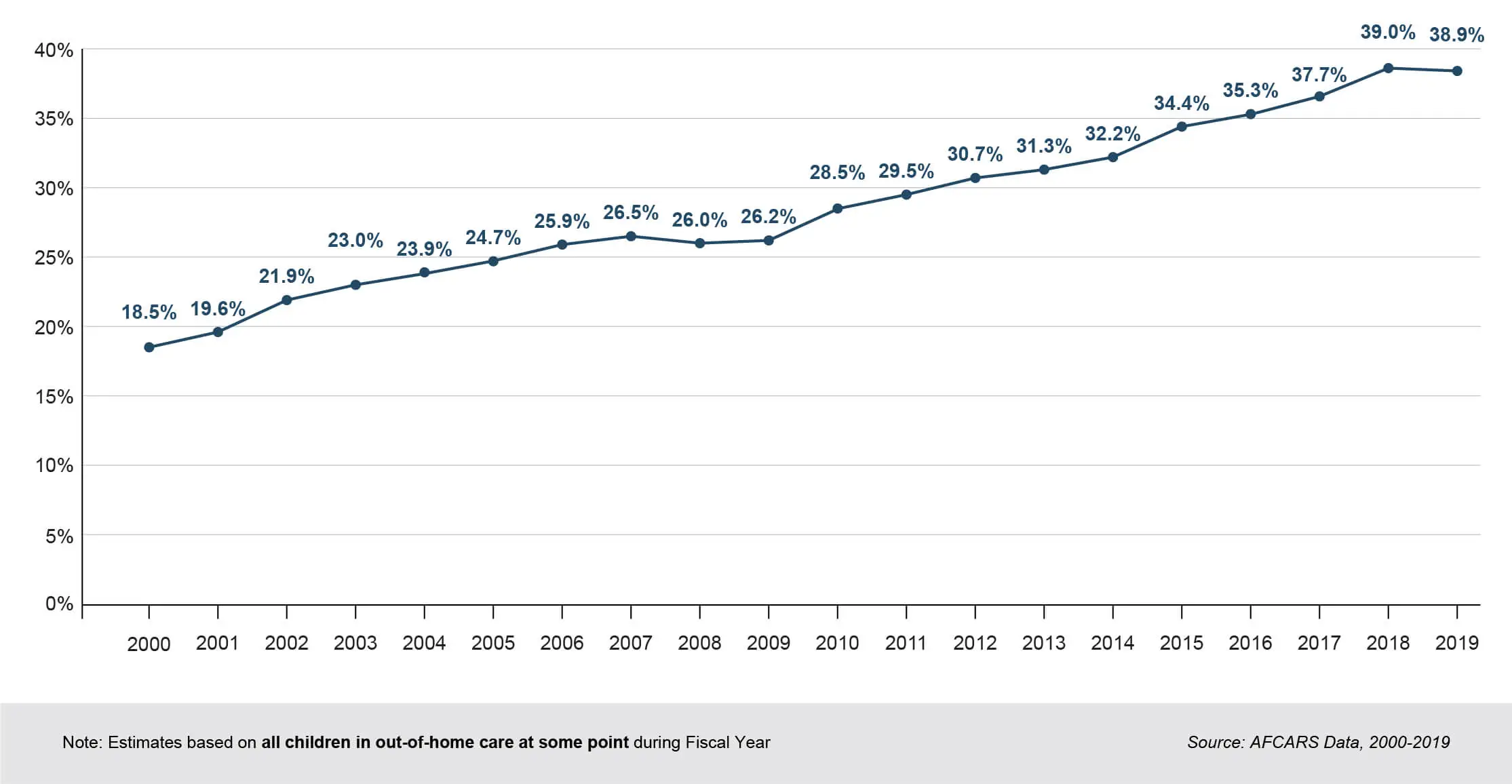For parents struggling with substance abuse, one of the most challenging consequences is the risk of losing custody of their children, a heartbreaking reality of addiction. Even in the depths of addiction, there is hope for redemption, the opportunity to reclaim oneself, and the ability to be a parent to one’s child. This article explores a journey that is both heart-wrenching and hopeful, serving as a reminder that it’s never too late to choose recovery and rebuild the precious bonds of family.
The Impact of Addiction on Parenting
Addiction is a complex and multifaceted condition that involves the compulsive use of substances or engagement in behaviors, even in the face of negative consequences. It is not simply a matter of willpower to stop an addiction, as there are changes in the brain that make it challenging to quit, even when the individual has a strong desire to do so.
When addiction infiltrates a family, the impact can be profoundly destructive. Relationships often strain under the weight of broken trust, unfulfilled promises, and erratic behavior. Addiction can severely compromise a person’s ability to parent effectively and provide a safe environment for their children.
The Challenges of Parenting with Addiction
Parents battling addiction often struggle with inconsistency, unpredictable behavior, and impaired judgment, which can lead to neglect or an inability to meet their children’s basic needs. The focus on acquiring and using the substance may overshadow the attention given to children’s emotional, physical, and developmental needs.
In some cases, the home environment may become unsafe due to the presence of drugs, alcohol, or related paraphernalia, exposing children to dangerous situations or individuals. In severe cases, a parent’s addiction can escalate to emotional, physical, or sexual abuse.
The Impact on Children
The consequences of growing up in an unstable environment shaped by addiction can be detrimental to a child’s mental, emotional, and physical well-being. Children may experience:
- Feelings of anxiety, fear, and insecurity
- Difficulty forming healthy attachments and relationships
- Behavioral and academic problems at school
- Increased risk of developing substance abuse issues themselves
When the safety and well-being of children are compromised, child protection services may need to intervene to ensure their safety, which can result in the removal of children from their parent’s custody.
The following graphs represent information from two data systems – the Adoption and Foster Care Analysis and Reporting System (AFCARS) and the Treatment Episode Data Set Admissions (TEDS-A).
Incidence of Identified Parental Alcohol or Drug Abuse as a Reason for Child Removal in the United States, 2019
*This image was taken from National Center on Substance Abuse and Child Welfare
The Legal Process of Losing Custody
The Role of Child Protective Services (CPS)
Child Protective Services (CPS) and the court system play a vital role in cases involving parental addiction. CPS is often the first point of contact when concerns arise about a child’s safety. Their responsibilities include:
- Investigating reports of abuse or neglect
- Conducting home visits
- Evaluating overall living conditions
If CPS determines a child is in immediate danger, they may initiate an emergency removal. The court system then reviews the evidence collected by CPS and hears testimony from involved parties to make a legally binding decision about custody. The court considers various factors, such as the child’s safety, the severity of the parent’s addiction, and the parent’s willingness and ability to seek treatment. Throughout this process, both CPS and the court aim to prioritize the child’s best interest, balancing the need for safety with the potential benefits of maintaining familial relationships.
How Does the Court Decide if a Child Should Be Removed?
The court uses a range of factors to determine whether a parent’s addiction poses a threat to a child’s well-being. Primarily, the court looks at evidence of neglect or abuse, which may be substantiated by:
- Child Protective Services investigations
- Police reports
- Medical records
- Witness testimony
This could involve instances where a child’s basic needs for food, shelter, education, or medical care are not met or when the child is directly exposed to harmful substances. The court also considers the parent’s past substance abuse, efforts toward recovery, and overall mental and physical well-being. The child’s age, vulnerability, and the presence or absence of another competent caregiver in the home may also play a part in the court’s decision. Above all, the court’s main priority is to ensure the safety and best interests of the child.
The first steps a parent should take are acknowledging the problem, expressing a sincere desire to change, and seeking professional help. This may include enrolling in a substance abuse treatment program, complying with court orders or requests from Child Protective Services, and participating in regular drug screenings to provide evidence of sobriety. It's also essential to ensure a stable living environment and demonstrate the ability to meet the child's needs.
The Legal Process of Removing Children
The process of removing a child from an addicted parent’s custody typically begins with a report or suspicion of child neglect or abuse. This could come from various sources, such as schools, hospitals, neighbors, or other family members. Once a report is made, CPS or a similar agency investigates the situation. If they find evidence that the child’s safety is at risk due to the parent’s addiction, they might temporarily place the child with a relative or in foster care.
The case is brought before a judge, who reviews the evidence and hears arguments from both sides. If the court determines that the parent’s addiction poses a significant risk to the child’s well-being, they may decide to terminate parental rights temporarily or permanently. The goal is always to act in the child’s best interest, considering their safety and well-being above all else.
💡
The Impact of Parental Substance Use Disorders on Children
According to the Substance Abuse and Mental Health Services Administration (SAMHSA), approximately 1 in 8 children aged 17 or younger live in households with at least one parent who has a substance use disorder. This highlights the far-reaching impact of addiction on families and the critical need for support and resources to help parents overcome addiction and provide stable, nurturing environments for their children.
The Emotional Toll of Losing Custody
Losing custody of a child due to addiction can trigger a myriad of emotional reactions in parents. Feelings of guilt, shame, and regret often dominate as they confront the reality of their addiction and its impact on their children. They may grapple with deep sorrow from the loss of daily contact and the parental role they once held. There’s also a significant amount of anxiety and fear about their child’s well-being and the uncertainty of future reunification.
In some cases, the pain of losing custody can exacerbate the addiction, as the parent may turn to substances as a coping mechanism for their intense emotions. However, this loss can also be a powerful catalyst for change, motivating some parents to seek help and start recovery.1
Impact on Children Separated from Their Parents
Children who are separated from their parents due to addiction often face significant psychological impacts. The sudden change in their living situation can evoke confusion, fear, and uncertainty. Some may blame themselves for their parent’s addiction or the subsequent separation, leading to guilt and low self-esteem. They might also struggle with feelings of abandonment and a deep sense of loss, even if they understand the reasons for the separation.
The trauma of witnessing a parent’s addiction and the disruption of separation can result in,
- Behavioral issues
- Academic problems
- Difficulties in forming healthy relationships
Longer-term, these children are at a higher risk of developing mental health issues, such as,
- Depression
- Anxiety
- Post-traumatic stress disorder
They may also be more likely to struggle with substance abuse themselves in adulthood. These children must receive adequate psychological support to help them navigate these complex emotions and challenges.2
Get Help for Addiction at Cornerstone
Our treatment programs in Scottsdale, Arizona, support parents in their recovery journey, helping them rebuild their lives and work toward regaining custody of their children.
Path to Recovery and Seeking Treatment
Finding the path to recovery from addiction starts with acknowledging the existence of a problem and expressing a sincere desire to change. This critical first step can often be the most challenging, as it requires self-awareness and acceptance of the addiction’s consequences. Once this hurdle is overcome, professional help should be sought immediately.
This assistance may come in various forms, such as:
- Detoxification programs
- Residential or outpatient rehabilitation
- Counseling
- Therapy
- Support groups like Alcoholics Anonymous or Narcotics Anonymous
These programs provide a structured environment where individuals can address the physical and psychological aspects of addiction, learn coping strategies, and develop a recovery plan. Alongside professional help, healthy lifestyle changes like regular exercise, a nutritious diet, and quality sleep can contribute to recovery. Finally, mending damaged relationships and building a robust support system are integral for sustained recovery.
It’s important to remember that recovery is not a destination but a journey filled with challenges and victories. With the right support and tools, recovery from addiction is possible.
Therapy can be incredibly beneficial in rebuilding the parent-child relationship. Individual therapy for the child can help them process their emotions and experiences related to the separation and their parent's addiction. Family therapy can provide a safe space for open communication, healing, and strengthening the bond between parent and child. A professional therapist can offer guidance and tools to navigate the complex emotions and challenges that may arise during rebuilding.
Importance of Seeking Treatment
Addiction treatment is vital not only for the individual struggling with addiction but also for their families, communities, and society at large. At its core, treatment aims to help individuals stop using substances, avoid relapse, and rebuild their lives in a healthy, productive manner. It addresses the complex interplay of physical, psychological, and social factors that contribute to addiction, enabling individuals to understand their triggers, develop coping strategies, and heal underlying issues.
Treatment provides an opportunity to mend damaged relationships and reconnect with loved ones, which is essential for parents striving to regain custody of their children. It’s also crucial for breaking the cycle of addiction reducing societal costs related to healthcare, crime, and lost productivity. Most importantly, effective treatment restores hope, empowering individuals with the skills and resilience they need to reclaim their lives from addiction and move towards a healthier, fulfilling future.
Possibility of Regaining Custody
The path to recovery plays a crucial role in improving a parent’s chances of regaining custody. Courts and Child Protective Services aim to ensure a child’s safety and well-being. When a parent demonstrates substantial progress in recovery, it signals a reduction in the risks associated with addiction, such as neglect or exposure to harmful substances and environments.
Successful completion of a rehabilitation program, continuous sobriety evidenced by drug screenings, and active participation in therapy or support groups showcase the parent’s commitment to change. By embracing recovery, parents can also improve their mental health, parenting skills, and ability to provide a stable living environment, all of which are key considerations in custody decisions.
A consistent, sincere journey toward recovery can significantly bolster a parent’s case for regaining custody.
Real-Life Examples: Addiction, Custody, and the Road to Recovery
Custody battles often arise when one or both parents struggle with addiction, compromising their ability to provide a safe and nurturing environment for their children. These legal disputes can be emotionally taxing for all parties involved, as the court must determine the best interests of the child while considering factors such as the severity of the addiction, the parent’s commitment to recovery, and the potential risks to the child’s well-being.
Parental resilience refers to the ability of parents to overcome challenges, such as addiction, and maintain a strong, positive relationship with their children. It involves developing coping mechanisms, seeking support, and consistently working towards personal growth and recovery. Resilient parents are better equipped to provide their children with a stable, nurturing environment and serve as positive role models.
Family reunification is the process of reuniting children with their parents after a period of separation due to addiction or other issues. It involves addressing the root causes of the separation, ensuring a safe and stable environment for the child, and rebuilding the parent-child relationship through therapy, consistent communication, and shared experiences.
Legal Steps to Regain Custody in Recovery
Regaining custody after losing it due to addiction often requires a comprehensive plan demonstrating substantial change and commitment to sustained recovery. The first step is to comply with any court orders or requests made by Child Protective Services. This often includes enrolling in and completing a substance abuse treatment program. Regular drug screenings may also be required to provide evidence of sobriety.
Parents may also be asked to participate in:
- Parenting classes
- Therapy to address underlying issues contributing to addiction
- Classes to develop healthier parenting strategies
Ensuring a stable living environment and a consistent income is crucial to demonstrating the capability of meeting a child’s necessities. Regular, positive visitation (if permitted) can demonstrate a commitment to rebuilding the parent-child relationship. It’s also beneficial to have a strong support system in place.
Cooperation with social workers, lawyers, and the court is paramount throughout the process. Every case is unique, so the path to regaining custody may vary. However, the ultimate goal is to show consistent, long-term change and the ability to provide a safe, nurturing environment for the child.

Rebuilding the Parent-Child Relationship
Celebrating Victories and Embracing a New Chapter
Successfully regaining custody after battling addiction is indeed a cause for celebration. It marks a significant milestone on the journey to recovery, reflecting the parent’s hard work, determination, and resilience. It symbolizes the restoration of a family, providing a chance for renewed relationships and healing.
However, it’s essential to recognize that this achievement is not the end but another step toward recovery and personal growth. It signifies a renewed commitment to maintaining sobriety, providing a nurturing environment for the child, and continually working on strengthening the parent-child bond.
This triumphant moment reminds us of the individual’s strength, ability to overcome life’s challenges, and the transformative power of love, perseverance, and hope.
Our evidence-based treatment approach at Cornerstone Healing Center in Scottsdale, Arizona, utilizes scientifically validated methods to effectively support and facilitate the recovery process. If you or a loved one is struggling with addiction, please get in touch with us for a free and confidential assessment today!
Key takeaways 📝
- Addiction can devastate families and lead to losing custody, but there is always hope for redemption and rebuilding family bonds.
- Seeking professional treatment, demonstrating a commitment to recovery, and improving parenting skills are crucial for regaining custody.
- Rebuilding parent-child relationships after addiction requires patience, consistency, and celebrating victories along the recovery journey.









